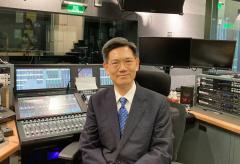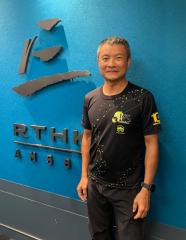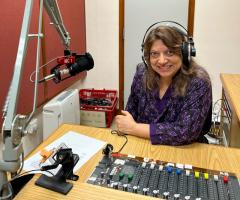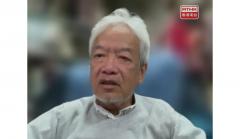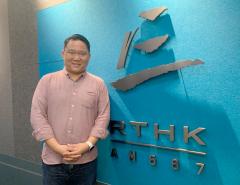簡介
Listen to #Hashtag Hong Kong every Sunday morning at 8.15
Focussing on issues affecting civil society, we'll hear from representatives of NGOs, associations, statutory bodies, and non-profit groups.
(Sundays 8.15am - 8.25am)
最新

Dr Joey Chan, Secretary of the Hong Kong Society of Sleep Medicine and CUHK Associate Professor (Clinical) Department of Psychiatry, Faculty of Medicine, CUHK
重溫
Paul Chan, Co-founder and CEO of Walk In Hong Kong
World Heritage Day 2024 marks on 18th April. The significance of this occasion resonates deeply within me. Beyond its global celebration of heritage conservation, this day serves as a call to action for communities worldwide to reaffirm our dedication to protecting our heritage and cultural identity. Today, I'm compelled to share my thoughts not just as a seasoned heritage and cultural tour operator, but also as a passionate advocate for the preservation of our city's rich heritage and culture.
Heritage transcends mere buildings and historic sites; it embodies the essence and identity of a city, weaving together the stories and memories of generations. Whenever I lead heritage tours and delve into the archives of old Hong Kong photographs, a profound sense of nostalgia washes over me. When I saw old pictures of the elegant colonial architecture of Central, the charming row of walk-up shophouses of Kowloon, or the rustic beauty of the New Territories – these are not mere structures but repositories of our collective history and livelihood. Sadly, many of these architectural gems have succumbed to the pressures of rapid urbanization and development.
Witnessing the loss of our heritage is truly heartbreaking, as each demolition represents a potential loss of our remaining sites if we do not take decisive action. Once these architectural marvels are gone, they cannot be replaced, and with their disappearance, we lose a vital part of our cultural identity. Missed opportunities to leverage our heritage as a unique selling point for our city are evident, especially as we work towards revitalizing our tourism industry
post-pandemic. Nevertheless, there is still time to effect change. Transitioning into a heritage advocate has led me to frequently ponder the relevance of my cause. To me, the answer is clear – we have a duty to conserve what makes our city exceptional. In a world saturated with standardized attractions and tourist traps, our heritage stands as a beacon of authenticity and uniqueness.
Safeguarding our heritage is imperative if we wish to maintain our status as a leading tourism destination."
That is the major reason why we launched the conservation campaign to save the State Theatre, the largest surviving standalone theatre building on Hong Kong Island. During the campaign, we've adopted a comprehensive approach with the hope of enhancing the survival chance of this building. Not only did we successfully lobby the theatre from a Grade 3 proposed Historic building status to that of Grade 1, but we also enhanced the public’s emotional attachment to the
site through talks, walking tours, and interviews, etc. To this day, we persist in refining our strategies to strike a balance between conservation with economic sustainability.
We know that heritage conservation isn't just about preserving physical structures; only by also excavating its stories and memories can we truly preserve the spirit of a place. That is why we have produced To Be Continued, a documentary which chronicles the life and legacy of State Theatre’s founder, Harry Odell, the first impresario in Hong Kong, whose relentless efforts to invite best performers from the world to Hong Kong has made our city already a “East-meets-West centre for international cultural exchange” in the 1950s.
We also recognize the crucial role of integrating heritage with sustainable tourism as a way to deepen our present connections to the past. As part of this recognition, we have launched a tourism innovation project supported by the Countryside Conservation Funding Scheme. Our project aims to revitalise the villages of Sha Tau Kok and Yan Chau Tong areas by introducing immersive and sustainable tourism experiences in their Hakka villages. By leveraging the rich heritage of Hakka houses and the picturesque village landscapes, we curate unforgettable experiences such as seasonal dining against the backdrop of a majestic Hakka mansion. These immersive experiences enable both visitors and locals to connect with and embody the stories, memories, and rituals, thereby passing on the spirit of the past and its cultures to the present. We firmly believe that such emotional encounters are integral to our ongoing efforts to advance the cause of heritage conservation.
As the Chinese proverb wisely reminds us, "A journey of a thousand miles begins with a single step." Next Thursday, on 18th April, I encourage you all to think about the ways we can increase awareness regarding the preservation of important monuments and cultures. Perhaps the most straightforward way to celebrate one’s cultural heritage on World Heritage Day is by authentically living one’s life in a way that embodies who we are and where we come from, but we can also think of the little ways we can protect our shared heritage and humanity. Look online to see if any community events are going on in the city that tell stories about our surroundings. Spread awareness by posting pictures of little-known historical sites on social media. World Heritage is about the humanity and stories we share, and our collective responsibility in keeping these stories and sites alive.
I urge you all to join me in this journey to protect and preserve our heritage. Let us celebrate our past, embrace our present, and safeguard our future.







